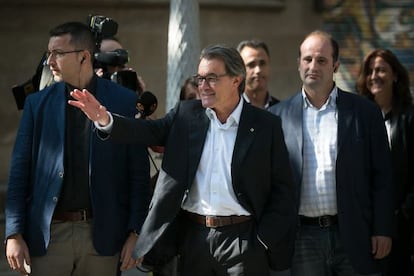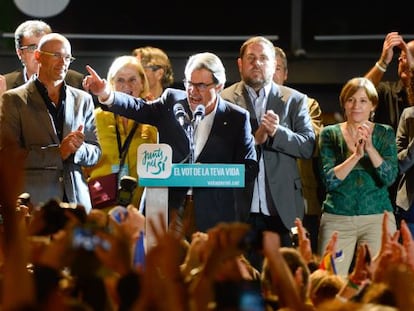Just 12 hours after elections, doubts mount about future of Artur Mas
Partner in Junts pel Sí bloc avoids coming out in support of the current regional premier Meanwhile, CUP’s Anna Gabriel has already said that he “is not indispensable.”

Just 12 hours after Catalonia held parliamentary elections – which pro-independence groups had cast as a de facto plebiscite on secession from Spain – the ruling Democratic Convergence of Catalonia (CDC) came out in defense of current regional premier Artur Mas, whose leadership is now being questioned on several fronts.
Party coordinator Josep Rull stated on Monday that Mas must remain “on the front line” in the new Catalan government, which will have to be hammered out in parliament. But Mas’s reinstatement is far from assured.
During their campaigning, CUP members repeatedly said they did not favor Mas as the new Catalan premier
After securing 62 seats in the regional assembly, Mas’s secessionist bloc, Junts pel Sí – which includes CDC and the Catalan Republican Left (ERC) – is now being forced to seek support from the leftist radicals of CUP, who obtained 10 seats at Sunday’s polls.
A minimum of 68 seats is required for an absolute majority, which would enable the secessionist project to move forward.
But CUP’s number-two official, Anna Gabriel, has already said that “Mas is not indispensable.” During their campaigning, CUP members repeatedly said they did not favor Mas as the new Catalan premier.
Meanwhile, Mas’s main partner in the Junts pel Sí bloc is avoiding voicing their outright defense of the Catalan premier.
“This is not about names; everyone counts, and we are counting on everyone,” said Sergi Sabrià, ERC spokesman, on Monday morning.
The republicans would like to create a secessionist government comprising Junts pel Sí, CUP and also Catalunya Sí que es Pot, a leftist group that includes anti-austerity Podemos. Although Podemos leader Pablo Iglesias has publicly stated that he does not want Catalonia to secede from Spain, Sabrià said on Monday that this group “also wants to begin a constituent process” in Catalonia.
But Catalunya Sí es que Pot has also stated that they do not want Mas in the premiership.
Regardless of this opposition to Mas by potential government partners, Jordi Turull, who is number 10 on the Junts pel Sí ticket, said on Monday that he is sure they will come to an agreement.
“We will be able to reach a deal,” he said on the Catalan public radio station RAC1. “Notwithstanding the statements that are made on election nights, you need to sit down to talk and negotiate a road map.”
Notwithstanding the statements that are made on election nights, you need to sit down to talk and negotiate a road map”
Turull also insisted that “rather than set conditions with people’s names,” what’s required is defining this road map to independence.
Meanwhile, anti-independence parties are already naming possible candidates to replace Mas at the helm of the Catalan government. The Popular Party (PP) candidate Xavier García-Albiol said on Monday that he sees Raül Romeva as the new premier. Romeva in fact ran as the top candidate with Junts pel Sí, while Mas ran in fourth position, but internally there was wide expectation that Mas would renew his mandate in the event of an election victory.
Albert Rivera, head of Ciudadanos – which soared to 25 seats on Sunday, making it the second-most-voted force in Catalonia – said that “the first thing is to get Artur Mas to resign.” Rivera also said he feels that Catalonia is headed for new elections because of the upcoming difficulties in forming a new government.
English version by Susana Urra.
Tu suscripción se está usando en otro dispositivo
¿Quieres añadir otro usuario a tu suscripción?
Si continúas leyendo en este dispositivo, no se podrá leer en el otro.
FlechaTu suscripción se está usando en otro dispositivo y solo puedes acceder a EL PAÍS desde un dispositivo a la vez.
Si quieres compartir tu cuenta, cambia tu suscripción a la modalidad Premium, así podrás añadir otro usuario. Cada uno accederá con su propia cuenta de email, lo que os permitirá personalizar vuestra experiencia en EL PAÍS.
En el caso de no saber quién está usando tu cuenta, te recomendamos cambiar tu contraseña aquí.
Si decides continuar compartiendo tu cuenta, este mensaje se mostrará en tu dispositivo y en el de la otra persona que está usando tu cuenta de forma indefinida, afectando a tu experiencia de lectura. Puedes consultar aquí los términos y condiciones de la suscripción digital.









































